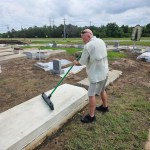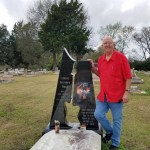Still Singing the Blues – Preserving a Legend’s Final Resting Place
Published 3:58 pm Friday, July 18, 2025





|
Getting your Trinity Audio player ready...
|
In a quiet cemetery tucked away in Southeast Texas, the headstone of a beloved American musician tells a story of resilience- not just of a man who poured his soul into every note, but of the friend who refuses to let his memory wash away. After being battered repeatedly by hurricanes over the years, the musician’s grave marker has cracked, shifted and been submerged- but never forgotten.
The headstone in question belongs to Clarence “Gatemouth” Brown, an American singer and multi-instrumentalist from Louisiana whose voice once echoed from the stages from the House of Blues in New Orleans to touring Russia as an American Music Ambassador with his band, Gates Express.
Trending
“He is the only musician that the Soviet Union ever contracted with for him to tour Russia,” Stephen “doc” Watson, friend and fellow musician said. “It was always through the U.S. State Department. He played all over the world as an American Music Ambassador.”
He was best-known as a blues performer, but his music was often eclectic and touched on genres including Cajun, country, jazz and rock and toll. Brown won a Grammy Award for Best Traditional Blues Album in 1983 for his album, “Alright Again!”
“He was known for a particular hit, “The Okie Dokie Stomp,” Watson said. “And that is the Gatemouth signature instrumental guitar song. It can be found on Youtube.”
Trending
His music touched generations, but his roots run deep in this small town, where he was laid to rest Sept. 10, 2005. For many in the community, the site has become more than a grave- it’s a piece of history, a sacred place where stories still whisper in the wind.
“I first saw him perform in the 1970s in Beaumont, I was impressed,” Watson said. “I was a working professional musician, and I thought that I was somewhat savvy about music and blues and jazz, and then I saw Gatemouth perform, and I was stunned. He was a musical Dervish.”
Watson explained that the Dervishes are a sect of the Sufi Muslim religion, and they put themselves into a mystical trance.
“They spin in circles, wearing a long skirt and coat, and they spin without getting dizzy,” he said. “Like the speed of an ice skater. And they perform on stage all over the world now. Gatemouth was an absolute musical dervish. He was slightly built, but when he stepped on stage, it was as if he plugged into 220 electrical sockets, and he just absolutely outplayed all the young guys in his band, he was a philosopher and storyteller. I love that he’s among the greatest American musicians and performers in the history of American music.”
Through all the years of destruction to his friend’s gravesite, Watson has taken it upon himself to restore the headstone time and time again. What started as a personal mission which grew into a public campaign- one rooted in love, music and a treasured memory of meeting his best friend.
“I sat in the crowd at the second show I attended and the lady that sat beside me had a toddler,” he said. “The toddler began to cry and get anxious. You know how toddlers are uncomfortable or started squirming, and I had some small pieces of fruit in my coat pocket and gave it to them. I then discovered that it was his wife and child. She introduced us and we connected right there- and we remained friends until he passed.”
Behind the scenes, Watson had been quietly rallying support- applying for grants, seeking local sponsorships, and launching fundraising efforts to cover restoration costs. The work wasn’t flashy but was tireless. Community members took notice, with donations trickling and volunteers offering to help and then one day, a famous country singer stepped up.
“The first grave was made possible by a group of people that were Gatemouth’s supporters, fans and family,” he said. “Then a storm came through Southeast Texas, and the grave marker was broken into multiple pieces. A friend of mine alerted me, and I drove over there and saw what had happened and I got it repaired by partnering with High Cross monuments owned by John Scott, who was also a Gatemouth fan. And when he heard it had been broken, and I asked his advice, he said, “I’ll have my crew over there and repair it correctly at no charge,” and they were there the next morning.”
Within two years, another storm came through, and the marker broke beyond repair again.
“I started an online fundraiser, and the goal was five grand,” he said. “I get a call from country music singer, Mark Chestnut, who says, “Don’t worry, I’ve got this covered.” And I said, “Oh, thanks, Mark. I really appreciate you pitching in because we’re almost there.” And he said, “No, I got the whole thing covered.” And he donates five thousand dollars- now we have enough money to finish the headstone and have it installed.”
Watson then makes a call to Lamar University to set up a Clarence “Gatemouth” Brown music scholarship with the remaining funds.
“Each year, a second-year music major at Lamar University will receive $1,000
Gatemouth scholarship, he said. “He’s not going to be forgotten and in the coming years, we’re going to start hosting a music fundraiser and have a concert to perpetually fund the music scholarship at Lamar.”
Though the winds may rise and the rains may fall, the American music legend story will not be erased. Thanks to a devoted friend and a growing chorus of supporters, his legacy is once again finding solid ground. And in the heart of Texas, the blues are still playing- not a song of sorrow, but a hymn of remembrance.
“He was absolutely unique in all American Music History,” Watson said. “And I miss my friend.”










